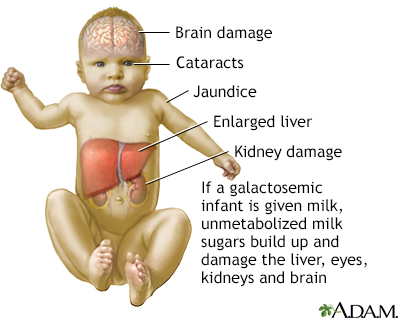Inborn errors of metabolism
Metabolism - inborn errors of
Inborn errors of metabolism are rare genetic (inherited) disorders in which the body cannot properly turn food into energy. The disorders are usually caused by defects in specific proteins (enzymes) that help break down (metabolize) parts of food.
A food product that is not broken down into energy can build up in the body and cause a wide range of symptoms. Several inborn errors of metabolism cause developmental delays or other medical problems if they are not controlled.
There are many different types of inborn errors of metabolism.
A few of them are:
Newborn screening tests can identify some of these disorders.
Registered dietitians and other health care providers can help create a diet that is right for each specific disorder.

An infant with galactosemia is unable to use (metabolize) the simple sugar galactose, which reaches high levels in the body, causing damage to the liver, central nervous system and various other body systems. An infant with galactosemia may develop jaundice, vomiting, lethargy, irritability and convulsions.

Blood is routinely drawn from newborn infants for testing. Blood is obtained by a heel stick and collected on a special blotter paper. Routine testing usually includes phenylketonuria, thyroid function, hemoglobin S (sickle cell disease), and may test for other disorders. Newborn screening programs vary from state to state. Testing can be tailored to the local population, determining what routine testing should be done.
References
Craigen WJ. Approach to inborn errors of metabolism. In: Goldman L, Cooney KA, eds. Goldman-Cecil Medicine. 27th ed. Philadelphia, PA: Elsevier; 2024:chap 189.
Shchelochkov OA, Venditti CP. An approach to inborn errors of metabolism. In: Kliegman RM, St. Geme JW, Blum NJ, et al, eds. Nelson Textbook of Pediatrics. 22nd ed. Philadelphia, PA: Elsevier; 2025:chap 104.
Version Info
Last reviewed on: 4/8/2025
Reviewed by: Anna C. Edens Hurst, MD, MS, Associate Professor in Medical Genetics, The University of Alabama at Birmingham, Birmingham, AL. Review provided by VeriMed Healthcare Network. Also reviewed by David C. Dugdale, MD, Medical Director, Brenda Conaway, Editorial Director, and the A.D.A.M. Editorial team.
